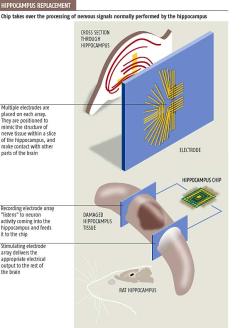World's first brain prosthesis revealed

Scientists in California are testing the world's first brain prosthesis - an artificial hippocampus, a silicon chip implant will perform the same processes as the damaged part of the brain it is replacing( damage due to stroke, epilepsy or Alzheimer's disease).The brain not only affects memory, but your mood, awareness and consciousness - parts of your fundamental identity.The hippocampus is the most ordered and structured part of the brain, and one of the most studied. Importantly, it is also relatively easy to test its function.The job of the hippocampus appears to be to "encode" experiences so they can be stored as long-term memories elsewhere in the brain. If you lose your hippocampus you only lose the ability to store new memories. That offers a relatively simple and safe way to test the device: if someone with the prosthesis regains the ability to store new memories, then it's safe to assume it works. They had to devise a mathematical model of how the hippocampus performs under all possible conditions, build that model into a silicon chip, and then interface the chip with the brain. It communicates with the brain through two arrays of electrodes, placed on either side of the damaged area. One records the electrical activity coming in from the rest of the brain, while the other sends appropriate electrical instructions back out to the brain.The hippocampus can be thought of as a series of similar neural circuits that work in parallel, so it should be possible to bypass the damaged region entirely.One drawback is that it will inevitably bypass some healthy brain tissue. But this should not affect the patient's memories and would be no different from removing brain tumours.
1 Comments:
Thanks for the information on how this brain prothesis works.
We recently wrote an article on using the same microchip to replace a part of the brain on Brain Blogger. Would it bring up ethic cotroversy? Would our brains reject the foreign object?
We would like to read your comments on our article. Thank you.
Sincerely,
Kelly
Post a Comment
<< Home